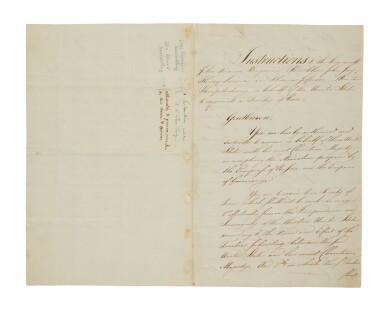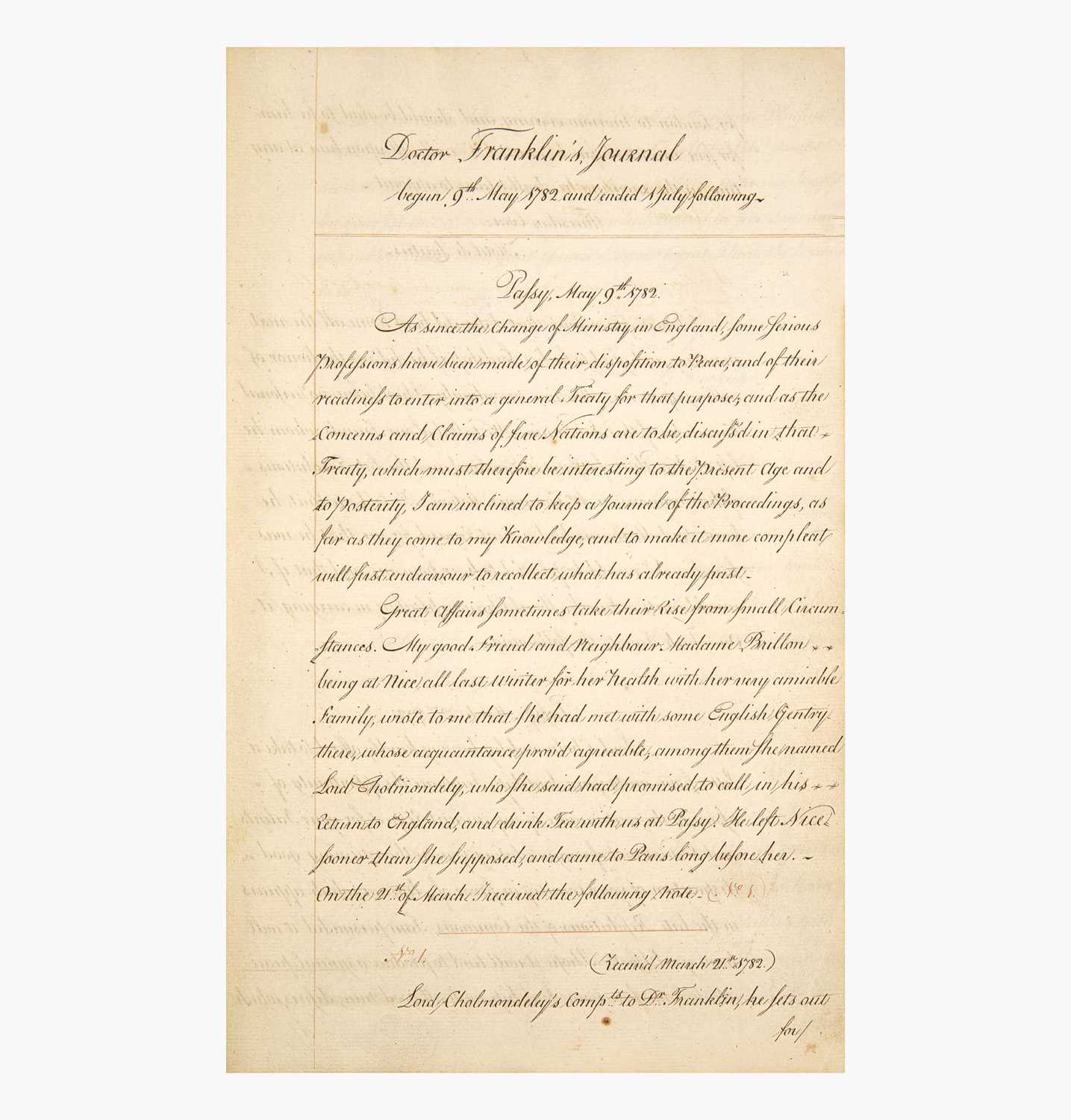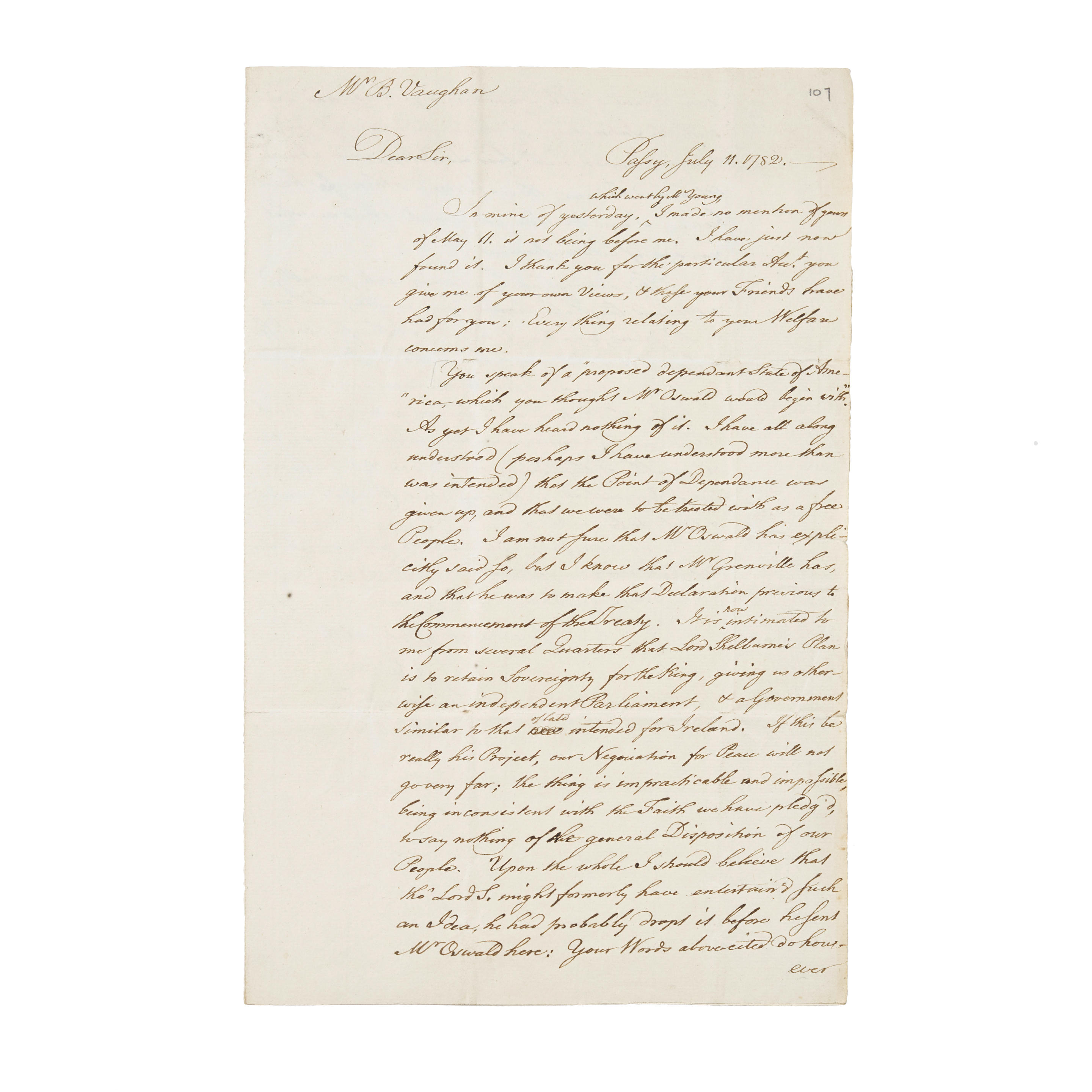Great Britain. Peace CommissionersManifesto and Proclamation. To the Members of the Congress, the Members of the General Assemblies or Conventions of the Several Colonies … and all others, Free Inhabitants of the said Colonies, of every Rank and Denomination. [New York : Printed by James Rivington, 1778] Broadside (484 x 382 mm). Three lines of headline, text in two columns separated by a row of type ornaments; soiled, rather worn with small losses at intersecting folds, marginal chips and tears, a few words supplied in very early repair, pen trials on verso, woodcut of royal arms trimmed away from top margin. Half red morocco slipcase gilt, chemise. A final attempt at reconciliation by the Earl of Carlisle, Sir Henry Clinton, and William Eden British "Commissioners to Treat, Consult, and Agree upon the Means of Quieting the Disorders Now Subsisting in Certain of the Colonies, Plantations, and Provinces in North-America." After the British defeat at Saratoga in October 1777, the British government decided to propose peace to the former colonies. Their offer included repeal of all Parliamentary taxation, full amnesty, and an arrangement for home rule within the empire. Through this proposal, the British hoped to bring the wayward colonies back into the fold and avert the French–American alliance they knew was in negotiation. The proposals, which might well have been accepted before the Declaration of Independence, were too little too late—by late 1778, the only terms the Continental Congress would entertain were a complete British evacuation and American Independence. This large and impressive—and quite scarce—broadside edition of the 3 October 1778 Manifesto and Proclamation was printed in New York by the Tory printer James Rivington. Rivington emigrated from London in 1760, but fled New York for England in November 1775 when the Sons of Liberty attacked his press and supposedly melted his type into bullets. After the British occupied New York, he returned to the city two years later and resumed his newspaper under the title Rivington's New York Loyal (later Royal) Gazette, which the patriots ridiculed as the "Lying Gazette." Surprisingly, Rivington remained in New York after the British Army evacuated. It has been suggested that this is because he spied for George Washington in the later years of the war, but Carol Sue Humphrey writes that "factual support for this story is slim, but not totally without merit." Rivington may have been allowed to remain in New York, but his newspaper, with a new name, received little support and he died in poverty in 1802 after spending two years in debtor's prison. REFERENCE Celebration of My Country 80; ESTC 15832; Evans 15832
Great Britain. Peace CommissionersManifesto and Proclamation. To the Members of the Congress, the Members of the General Assemblies or Conventions of the Several Colonies … and all others, Free Inhabitants of the said Colonies, of every Rank and Denomination. [New York : Printed by James Rivington, 1778] Broadside (484 x 382 mm). Three lines of headline, text in two columns separated by a row of type ornaments; soiled, rather worn with small losses at intersecting folds, marginal chips and tears, a few words supplied in very early repair, pen trials on verso, woodcut of royal arms trimmed away from top margin. Half red morocco slipcase gilt, chemise. A final attempt at reconciliation by the Earl of Carlisle, Sir Henry Clinton, and William Eden British "Commissioners to Treat, Consult, and Agree upon the Means of Quieting the Disorders Now Subsisting in Certain of the Colonies, Plantations, and Provinces in North-America." After the British defeat at Saratoga in October 1777, the British government decided to propose peace to the former colonies. Their offer included repeal of all Parliamentary taxation, full amnesty, and an arrangement for home rule within the empire. Through this proposal, the British hoped to bring the wayward colonies back into the fold and avert the French–American alliance they knew was in negotiation. The proposals, which might well have been accepted before the Declaration of Independence, were too little too late—by late 1778, the only terms the Continental Congress would entertain were a complete British evacuation and American Independence. This large and impressive—and quite scarce—broadside edition of the 3 October 1778 Manifesto and Proclamation was printed in New York by the Tory printer James Rivington. Rivington emigrated from London in 1760, but fled New York for England in November 1775 when the Sons of Liberty attacked his press and supposedly melted his type into bullets. After the British occupied New York, he returned to the city two years later and resumed his newspaper under the title Rivington's New York Loyal (later Royal) Gazette, which the patriots ridiculed as the "Lying Gazette." Surprisingly, Rivington remained in New York after the British Army evacuated. It has been suggested that this is because he spied for George Washington in the later years of the war, but Carol Sue Humphrey writes that "factual support for this story is slim, but not totally without merit." Rivington may have been allowed to remain in New York, but his newspaper, with a new name, received little support and he died in poverty in 1802 after spending two years in debtor's prison. REFERENCE Celebration of My Country 80; ESTC 15832; Evans 15832












.jpg)

Testen Sie LotSearch und seine Premium-Features 7 Tage - ohne Kosten!
Lassen Sie sich automatisch über neue Objekte in kommenden Auktionen benachrichtigen.
Suchauftrag anlegen